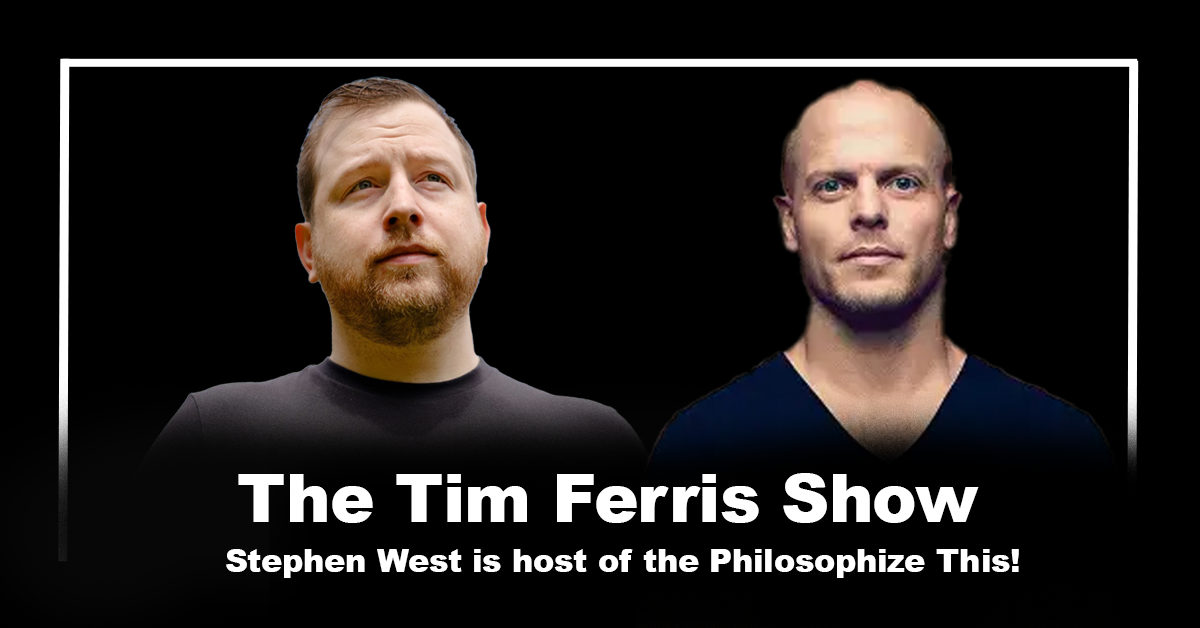Hey everyone,
This week on the Tim Ferriss Show, Tim has a fascinating and deeply personal conversation with Stephen West, the creator and host of the incredibly popular and accessible podcast, Philosophize This! While many know Stephen for his ability to distill complex philosophical ideas, this episode dives into his own remarkable and challenging journey – from dropping out of high school at 16 and working warehouse jobs to discovering philosophy by Googling “wisest person in history” and eventually building his influential show.
This isn’t just a story about podcasting; it’s about self-education, finding mentors in unexpected places (like Ralph Waldo Emerson and Seneca), the practical application of philosophy to everyday life, the importance of “being brave” enough to share your perspective, and how Stephen views philosophy not as a static noun, but as an active verb – a way of constantly rethinking and re-engineering our understanding of the world.
They explore Stephen’s challenging childhood, his early work experiences, the philosophical underpinnings of the 4-Hour Workweek, the concept of amor fati (love of fate), and how focusing on contribution over personal success can lead to a more fulfilling life.
Here are the detailed key insights and takeaways:
Stephen’s Unconventional Path:
- Challenging Childhood: Faced difficulties leading to time in Child Protective Services and dropping out of school at 16 to support himself.
- Warehouse Work: Worked physically demanding warehouse jobs, experiencing the wear and tear but also finding unexpected value in the time to listen to audiobooks (initially philosophy and talk radio).
- Discovering Philosophy: Felt a need for mentors and guidance; literally Googled “wisest person in history,” which led him to Plato’s dialogues about Socrates, and he was hooked. Found philosophy voluntary and empowering, unlike compulsory school subjects.
- Starting the Podcast: Realized there was a gap in the market for accessible philosophy content. Inspired by creators like Dan Carlin, he saw podcasting as a way to explore ideas and share them, initially doing it alongside warehouse work on weekends.
Philosophy in Practice:
- Disruption of Common Sense: Stephen defines philosophy as the “disruption of common sense” and a “gym for rethinking.” It’s about questioning assumptions and seeing reality in new ways.
- A Verb, Not a Noun: Views philosophy as an active process, a “conceptual engineering” of our worldviews, rather than a fixed set of doctrines or protocols to live by. It’s about doing philosophy, not just knowing about it.
- Iterative Process: Like an engineer refining a bridge, philosophers test and rebuild concepts based on assumptions. The goal isn’t necessarily a final “correct” answer but a more robust understanding.
- Finding Your Lane: Inspired by creators who found their unique voice (like Dan Carlin), Stephen focused on developing his own style rather than imitating others, even if it meant taking a negative inspiration (i.e., what not to do).
- Practical Application: Believes philosophy’s value lies in its ability to help us navigate life’s challenges, reframe difficulties (like amor fati – loving your fate), and generate better questions, even if it doesn’t provide easy answers.
On Mentors & Influence:
- Emerson & Self-Reliance: Inspired by Emerson’s essays, particularly the idea that you don’t need to be a “genius” to contribute valuable ideas; you just need to be brave enough to say them. Be a catalyst for sentiments that already exist.
- Seneca & Stoicism: Found value in Stoic ideas during challenging times.
- Reading Broadly: Emphasizes reading secondary sources first when tackling complex thinkers to get context before diving into dense primary texts.
- Modern Mentors: Admires contemporary figures who embody certain principles, even if not philosophers (e.g., using Dave Chappelle or Miles Davis as examples of unique paths).
Key Concepts Discussed:
- The 4-Hour Workweek: Stephen saw it as a philosophical text, questioning assumptions about work, retirement, and automation.
- Amor Fati (Love of Fate): Embracing reality as it is, including suffering, rather than denying it or wishing it were different. Finding the “silver linings” as a practical application.
- Wittgenstein’s Ladder: The idea that philosophical arguments are tools (ladders) to reach a new perspective, after which the tool itself can be discarded.
- Gilles Deleuze: Mentioned as a “bizarre” but influential philosopher who viewed reality as constantly moving and changing, emphasizing verbs over nouns and “machines” (assemblages) over fixed concepts.
- Meaning & Contribution: Shifting focus from “What do I want?” to “What contribution can I make?” as a path towards a more fulfilling life, reducing the pressure of ego and personal success metrics.
On Podcasting & Content Creation:
- Authenticity: Found success by leaning into his authentic self and way of exploring ideas, rather than trying to fit a pre-existing mold.
- Iterative Growth: Started small, learned along the way, wasn’t afraid to evolve the format and approach over 225+ episodes.
- Focus on Content Quality: Believes deeply in creating valuable, high-quality content first and foremost, seeing monetization (ads, Patreon) as secondary.
- Don’t Chase Perfection: Avoided getting paralyzed by needing everything to be perfect before launching; focused on starting and iterating.
Final Thought:
Stephen West’s story is a powerful testament to the transformative power of self-directed learning, intellectual curiosity, and finding meaning through contribution. His journey highlights how philosophy, far from being a dusty academic pursuit, can be a vital, practical tool for navigating life, challenging assumptions, and ultimately, living more bravely and intentionally. His podcast, Philosophize This!, stands as a remarkable achievement in making complex ideas accessible and engaging for a massive audience.
Find Stephen West:
- Podcast: Philosophize This! (available everywhere)
- YouTube: @philosophizethispodcast
- X: @iamstephenwest
Until next time,
The Podcast Notes Team





